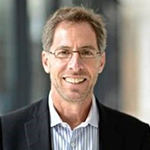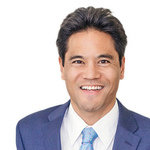BY LISA EISENHAUER
April 17, 2020
In his research on what makes a public health campaign effective, Edward Maibach has found that one key component is that the information being shared come from trusted sources.

Maibach
"Health professionals are, fortunately, one of the most trusted sources in American society and societies around the globe today," says Maibach, director of the Center for Climate Change Communication at George Mason University in Fairfax, Virginia.
During a webinar broadcast April 13 to mark Earth Day, Maibach offered advice for how health care providers can use their positions of trust to convince the public of the need for action to address global warming. "How to Talk About Climate Change," was co-sponsored by CHA and the Catholic Climate Covenant.
He said that climate change and its causes, such as pollution from the burning of fossil fuels, have been linked to increases in many health risks to humans, including a rise in insect-borne diseases and other illnesses and deaths from dangerous weather events.
"The skin that we have in this game of climate change is really our own skin, and that's a very important realization, and it's a very clear introduction for health professionals to get involved in the conversation," he said.
It's personal
Maibach pointed to a survey done jointly by the Center for Climate Change Communication at George Mason University and the Yale Program on Climate Change Communication in December 2018 that found that half of Americans believe that they personally will be harmed moderately or a great deal from global warming and 56 percent expect that members of their family will be harmed.
He said those findings indicated a major shift in Americans' outlook from a decade earlier, when surveys showed that most saw the threat from a warming planet as distant from them in both time and geography.
Another major shift that surveys, including one done recently by the nonprofit communications group Climate Nexus, have found, Maibach said, is that in recent years people are becoming aware of the specific health threats posed by climate change.
"The number one and number two reasons why people support climate action is because they believe it will protect our health and because they believe we have a moral responsibility to protect future generations, particularly our own children's generation and their children's generation and their children's," he said.
Keep it simple
To encourage others to take action, Maibach said the best strategy is to use simple, clear messages repeated often by a variety of trusted sources. "When we hear one thing, we're more likely to pay attention to it and process it deeply enough such that it will influence how we think going forward," he said.
In addition to spreading the word about the threats posed by global warming, Maibach said it is important that health care professionals assure others that there is action that can be taken to address those threats, such as ending the use of carbon-emitting fossil fuels.
Maibach offered several sources of information about the impact of climate change on health for clinicians who want to use their status as reliable sources to spread the word. Among them are the U.S. Climate and Health Assessment and the Fourth National Climate Assessment. Both were done by the U.S. Global Change Research Program, a program mandated by Congress to coordinate federal research and investments in understanding the forces shaping the global environment and their impacts on society.
Another source he pointed to is a report done by the Center for Climate Change Communication called "Medical Alert! Climate Change Is Harming Our Health." The report covers eight key ways that climate change is harming the health of Americans, including by undermining the nutritional value of crops and by the mental health consequences of extreme weather events.
"We actually did a very large randomized controlled trial, and exposing a random cross-section of Americans to information about these health impacts of climate change significantly and substantially improved their understanding of climate change and it increased their engagement in the issue," Maibach said.

Aguto
He said that Climate Central, a group of scientists and communicators, offers localized reports on climate change issues. Those reports are available at medialibrary.climatecentral.org.
Tying activism to Catholicism
Also, during the webinar, Jose Aguto, associate director of the advocacy group Catholic Climate Covenant, discussed how environmental activism fits into the basic tenets of Catholicism and has been encouraged by recent popes. His said his group's efforts are based on Catholic values that "transcend the partisanship and the rancor and the hatred and the confusion that go along with climate change so that we as a world can then be redeemed by our togetherness in our understanding of care for creation."
Among covenant's specific projects is a grant program to fund events related to the fifth anniversary of Laudato Si, Pope Francis' encyclical calling for action to confront the environment crisis.